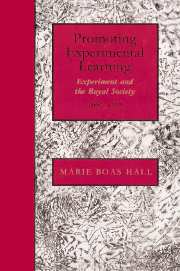Book contents
- Frontmatter
- Contents
- List of figures
- Preface
- A note on dates
- 1 Introductory
- 2 Aims and ideals
- 3 The record of the minutes 1660–1674
- 4 The communication of experiment 1660–1677
- 5 The record of the minutes 1674–1703
- 6 The communication of experiment 1677–1803
- 7 The record of the minutes 1703–1727
- 8 The communication of experiment 1703–1727
- 9 The view of the world; friend and foe
- Abbreviated titles
- Notes
- Bibliography
- Index
1 - Introductory
Published online by Cambridge University Press: 03 December 2009
- Frontmatter
- Contents
- List of figures
- Preface
- A note on dates
- 1 Introductory
- 2 Aims and ideals
- 3 The record of the minutes 1660–1674
- 4 The communication of experiment 1660–1677
- 5 The record of the minutes 1674–1703
- 6 The communication of experiment 1677–1803
- 7 The record of the minutes 1703–1727
- 8 The communication of experiment 1703–1727
- 9 The view of the world; friend and foe
- Abbreviated titles
- Notes
- Bibliography
- Index
Summary
The business of the Society in their Ordinary Meetings shall be to order, take account, consider, and discourse of philosophical experiments and observations; to read, hear, and discourse upon letters, reports, and other papers concerning philosophical matters; as also to view, and discourse upon, rareties of nature and art; and thereupon to consider, what may be deduced from them, or any of them; and how far they or any of them, may be improved for use or discovery.
So run statutes of the Royal Society as passed in 1663 and so also those of 1939 and ever since. Moreover, in 1663 there was also a separate chapter of the statutes devoted to the making of, reporting on and financing of experiments. But the statutes of 1847, which were intended to embody new reforms which should render the Royal Society more strictly scientific than it had become in earlier decades, read, starkly,
The business of the Society in their ordinary Meetings, shall be to read and hear letters, reports, and other papers, concerning Philosophical matters.
These mid-nineteenth-century statutes in fact recognised a situation which had existed throughout much of the previous hundred years, a period during which both experiment and discussion were slowly abandoned and the character of the Royal Society's meetings altered, changing from an atmosphere of lively discussion and debate and the frequent display of experiment to one which was determinedly formal and lifeless.
So, paradoxically, the Royal Society no longer reflected the practice of contemporary science which was certainly devoted to experiment.
Information
- Type
- Chapter
- Information
- Promoting Experimental LearningExperiment and the Royal Society, 1660–1727, pp. 1 - 8Publisher: Cambridge University PressPrint publication year: 1991
